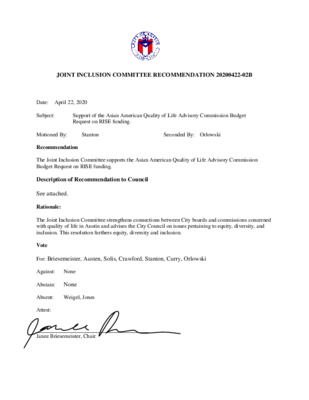20200422-2B part 3: Budget Request on RISE funding — original pdf
Recommendation

Date: April 22, 2020 Subject: JOINT INCLUSION COMMITTEE RECOMMENDATION 20200422-02B Support of the Asian American Quality of Life Advisory Commission Budget Request on RISE funding. Stanton Seconded By: Orlowski Motioned By: Recommendation The Joint Inclusion Committee supports the Asian American Quality of Life Advisory Commission Budget Request on RISE funding. Description of Recommendation to Council See attached. Rationale: The Joint Inclusion Committee strengthens connections between City boards and commissions concerned with quality of life in Austin and advises the City Council on issues pertaining to equity, diversity, and inclusion. This resolution furthers equity, diversity and inclusion. Vote For: Briesemeister, Austen, Solis, Crawford, Stanton, Curry, Orlowski Against: None Abstain: None Absent: Weigel, Jones Attest: Janee Briesemeister, Chair 2020-2021 Budget Recommendations Root Cause Analysis Story: What did you hear from the community? This request is related to the RISE relief approved by Austin City Council on April 09, 2020 of 15 million dollars allocated to the Austin community to fill the gaps in the Austin community to either lower income communities, communities that are unemployed or underemployed. Furthermore, it is the mission of the resolution that, “RISE relief can be achieved by expanding the capacity and reach of community-based organizations that may already be in partnership with the City of Austin, but may also require new partnerships with specialized providers with existing models to reach particular populations in new ways that meet impacted families where they are. Services and direct assistance should target populations who are traditionally marginalized or typically face additional barriers to enrolling in assistance programs, such as, but not limited to, language barriers. Services and assistance should be distributed by providers that have a history of trust and success in reaching communities of color, the LGBTQ+ community, immigrant communities, and other historically marginalized communities.” Problem: What is the problem you identify? There are few Asian organizations that are directly in place in Austin to direct this funding towards eligible members of the Asian community in Austin. Furthermore, there is a large segment of the Austin Asian population that that might not be eligible for the stimulus payments under the CARES Act signed into law by the federal government. This affects many Asian families here in Austin. How does the problem show up in your community? Who is most impacted by the problem? There is a large segment of the Austin Asian population that that might not be eligible for the stimulus payments under the CARES Act signed into law by the federal government. This especially applies to employees of small businesses, restaurant employees, Asian immigrants, and other Asians in the community that are low income or unemployed. Furthermore, barriers to language access affects the Austin Asian population, resulting in difficulties in applying for the RISE relief payments or even knowledge that the RISE payments are available. Such payments will help the Austin Asian population with remedies such as: Improve food access; Provide rental or mortgage assistance; Provide assistance with necessary bills, such as utility bills to enable children to attend school remotely; Assist with medical expenses; Assist with the purchase of diapers and baby formula and other child-care expenses; Assist survivors of domestic violence; Case management; or Other direct relief services provided by community-based organizations to assist individuals and families in meeting basic needs and alleviating hardships. Considering all of the information you have or have not collected above, how do we solve for this problem? To resolve the issues stated above, allocating funding towards Austin Asian Community Health Initiative, and Asian Family Support Services of Austin to help with translation, community outreach, and identification of eligible individuals is key. In order to access the entire population of Austin to access the RISE emergency funds, it is vastly important to have translation in key languages and conduct outreach in communities that are typically underserved. Thus, we solve this problem by directing Austin Public Health to allocate funds to resolve the problems stated herein. After question three, which questions from the flowchart are you prepared to answer? __Is there funding? Yes __Which department holds the funding? Austin Public Health ___How much funding is there? 15 Million Dollars ___Which orgs receive it? __How is success measured? Success is measured when all communties are accessed. __What are the impacts, and gaps? The impacts are language barriers, technology barriers, and lack of community outreach.